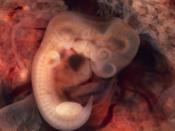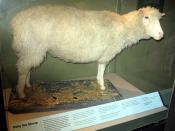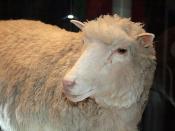The success of cloning Dolly the sheep five years ago in Scotland has raised the controversy of the possibility of ever doing the same with human life. All the same animals such as sheep, mice, goats, kittens, and pigs have all been cloned. Nevertheless, the thought of cloning humans seem so far fetched. That was only before Advanced Cell Technology in Worcester, Massachusetts publicized its attempt in progress to clone a human embryo, and at the time was in its six-cell stage. According to the GNN Genome News Network, an Italian doctor claims to have cloned and implanted a human embryo into a woman's uterus. However, the question that must be raised is there possibly enough evidence that proves cloning to be effective and safe? A new study conducted by Rudlolf Jaenisch and his collegues at the Whitehead Institute for Biomedical Research in Cambridge, Massachusetts, reveals that the genomes of cloned mice are severely compromised.
The study consisted of DNA microarray technology, where over 10,000 genes from liver and placenta cells from cloned mice were analyzed and found that up to four percent of the genes do not function normally.
Additionally, there have been two camps that cloned mammals, less than ten percent of cloned embryos survive. All the while, the fortunate embryos that do survive are typically oversized at birth have grossly large placentas. It is known that those embryos typically die at a much younger age than their naturally bred counterparts. Jaenisch says that the apparent problem of the clone is from changes in the normal program of gene activation, or expression. The gene activation or expression led researchers back to the DNA microarray technique used on the mice, which concluded that in the placental cells, over 200 genes were more or less active compared to normal embryos, as well as for dozens of genes in liver cells. Although, due to all the errors in gene expression, Jaenisch thought it was amazing that the embryos survived to birth. However, it is the mystery of the gene expression that has scientist aroused.
Scientist has justified the cloning of animals for commercial use and argue that an offspring of an cloned animal are normal because the egg and sperm experiences the same process of reprogramming and the cloning process does not affect the primary DNA structure. Nevertheless, it all seems to be justifications for acts of experiments that are morally and ethically wrong. In my opinion, no man on earth has the right to even tamper with the works of the Creator. It is funny because it has never occurred to man that reason for all the errors and mysteries in cloning may be due to the nature of our beings. Perhaps, man should not tamper with creation despite the desperate attempts to find cures for terminal illnesses and preservation of life. Should it come a time when humans must realized that fate has seized them in its grip and face reality or we continue down a path that we truly know nothing about? It is these very questions that should be taken into consideration when we play around with Creation, Nature, and the Earth because it will only be as good to us as we are to them.





